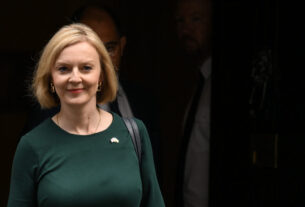BERLIN — German Chancellor Olaf Scholz used his predecessor Angela Merkel’s famous saying Wir schaffen das (“We can do it”) on Tuesday as he promoted his government’s efforts to exit a long-standing dependency on Russian gas and boost the use of renewable energies.
Speaking at the Economic Forum of his Social Democratic Party in Berlin, Scholz said his government was rolling out new laws to prepare Germany “for a difficult, difficult situation,” alluding to fears that Russia might cut off gas supplies to Germany next week, which could plunge the EU’s biggest economy into a recession.
The German government on Tuesday proposed emergency legislation that would allow it to bail out ailing energy companies and potentially introduce a levy that would equally distribute growing gas prices among private customers and companies.
Scholz said that efforts to get Germany off Russian gas were combined with the “very ambitious project” to make the country, and the entire EU, completely emissions-free by 2045. This required “the largest industrial modernization in well over 100 years,” the chancellor added.
He then said: “My thesis is: Wir schaffen das, or we say: Wir kriegen das hin” (which equally translates to “We can do it”).
Scholz’s remarks were a clear reference to the famous catchphrase by Merkel, who said “Wir schaffen das” in 2015 as a defiant but also controversial response to the migration crisis engulfing Europe at that time. And indeed, Scholz’s words immediately triggered laughter and applause from the audience at the economic forum.
The ruling coalition of Social Democrats, Greens and Free Democrats also reached a deal on Tuesday to move ahead with a law to boost Germany’s transition to renewable energies, which are supposed to cover 80 percent of the country’s energy demand by 2030. The chancellor urged lawmakers to now approve this legislation “in the shortest possible time.”
The chancellor also hit out at the previous government led by Merkel for failing to anticipate Germany’s problematic reliance on Russian gas and realizing that Moscow had seemingly deliberately let German gas storage facilities run empty ahead of the war to maximize the economic pressure on the country.
“One wonders why no one has drawn a conclusion from the fact that it was precisely the gas storage facilities owned by Russian companies that had become so empty, so conspicuously empty?” Scholz asked.
In fact, Scholz himself played a crucial role in the previous government as finance minister and vice chancellor, though neither he nor his Social Democratic Party had run the economy ministry, which is directly responsible for overseeing gas deliveries and gas storage.
This article is part of POLITICO Pro
The one-stop-shop solution for policy professionals fusing the depth of POLITICO journalism with the power of technology
Exclusive, breaking scoops and insights
Customized policy intelligence platform
A high-level public affairs network




